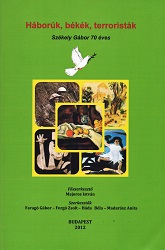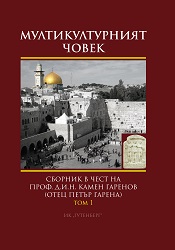
We kindly inform you that, as long as the subject affiliation of our 300.000+ articles is in progress, you might get unsufficient or no results on your third level or second level search. In this case, please broaden your search criteria.


The Macedonian charity, cultural and educational fraternities in Bulgaria were established by the refugees from Macedonia who came to this country after Kresna-Razlog Uprising in 1878, the Illinden (St. Elijah's Day) Uprising in 1903, the Second Balkan War in 1913 and World War I. They originated on a purely fraternity basis with the aim of charity work, mutual support and preservation of family roots. The number of fraternities established by the refugees grew with their number in Bulgaria, running parallel to and enrichment of the forms of organization: clubs emerged, ephorie (boards of trustees), cooperatives, cultural and educational scocieties, orphanages, including banks such as the Macedonian Cooperative Bank and the Macedonian Popular Bank, and the Macedonian Research Institute among others. At the beginning of May 1934 there were about 540 Macedonian refugee structures established all acros Bulgaria with 50634 regularly reported members. The activity of the Macedonian fraternities was officially terminated with Decree № 130 of 1951 of the Presidium of the National Assembly. A special circular letter of the Ministry of Justice was issued whereby the company cases of the refugee organization were transferred to the regional and district courts where single-member panels presided. The decree of the Presidium transferred the entire property of the Macedonian charity fraternities and other Macedonian organisations to the newly-established Gotse Delchev Society in Sofia.
More...
The paper of the two authors essentially provides the academic, cultural and political audience with the opportunity to have contact with an authentic document which was preserved for over 40 years. It is a tale of what was heard, seen and particularly experienced in the 1970's in the relations between the two political colossi in Bulgaria at that time. The account of the meetings with Todor Pavlov and the facsimiles of the published documents provoke the way of thinking of contemporary times and the conclusions that can be made.
More...
With the formation of Islam as a religion in the 7th century, initially spread over the Arabian Peninsula, Christianitu faces a new challenge, which the Christian theologians are not entirely prepared to meet since this "doctrine" can not be "seen" through the eyes of the Antiquity. Saint John of Damascus and Theodore Abu Qurrah represent the early polemics with Islam. Their answer to the call of the minaret reveals two important aspects of the Christian polemics with Islam: through knowledge of the Qur'an as a text and highly competent polemical presence. These two features, in one way or another, were later recognized, assembled and followed by all Christian polemicists in the East and West.
More...
The Peresopnitsia Gospel (PG) is manuscript created in the second half of the 16th century in the contact zone of two traditions, the West and the East. The manuscript was made in a way that allowed it to be used by representatives of both the Roman and the Byzantine rites, which is evidenced by several type of textual breakups: liturgical, one approaching Byzantine lectionaries in the large chapters also continues the Latin tradition reflected in Gennady's Bible (GB) and other manuscripts related to it.
More...
In the past years a lot of lead amulets have been found in Bulgaria and some of them enchantments on them against Nejit, who are believed to be a humanoid spirit in the folklore. The oldest amulet found is dated from 10-11th century. This paper is focused on an amulet that has been found recently near the town of Kyrdjali. The uniqueness of this amulet is that a mix of cyrillic and glagolic letters have been written on it. Two copies of the text exist that were analysed and described once by German and second time by Bulgarian linguists. The interval between the two examinations was 10 years. In this article a comparison between the Bulgarian and the German reconstruction of the text is being made as the two texts are evaluated in the context of the newest information.
More...
The Old Bulgarian Blessing of the Waters on the Eve of Epiphany from X-XI centuries is the earliest Slavic copy of that work, giving an account of the very old routine of the Holy Sanctification of the Water, which is performed nowadays on the eve of Epiphany (January 6 - new stile). During the examination of the later Slavic copies of this Convention from the XV-XVII centuries, were discovered two unknown short redactions - one of them from the XVth c. - in Russia, Serbian, and Bulgarian Books of divine services and Prayer-books, and the other - from the year 1782 (in a Church Slavic prayer-book from Hilandar monastery, in Mount Athos). In the article, for the first time, is published the text of the short redaction of the Blessing of the Water on the Eve of Epiphany, from the above mentioned XVIIIth c. Preayer-book.
More...
The author makes a short review of publications of Arabic Ottoman inscription in honour of a sheikh. The paper provides a facsimile, a deciphered text transcribed in Latin, a translation in Bulgarian and coments on the monument. The inscription shows that there were members of the Qadiri tariqa (Sufi order) in the 18th century in Plovdiv and maybe that there was a tekke of this brotherhood.
More...
The paper describes the main peculiarities of the Stanimaka (Asenovgrad) subdialect in the first half of the 20th century based on a literary text written by Hristo Daskalov. A comparison with some neighbouring sub-dialects has also been made.
More...
The article is dedicated to the problems that emerged in Bulgarian after the eradication of the so-called, double "е" pronounced differently in East and West Bulgaria. The author discusses the reasons, political ones included, which led to the maiming of the Bulgarian language.
More...
In this study on Angel Karaliichev literary critic Simeon Soultanov wrote that, in order to illustrate his idea of literature that elevates our souls, Emilian Stanev first listed the names of Vazov and Yovkov, and then added the names of Elin Pelin and Angel Karaliichev. "But what does Bilgarian writes mean?" the critic asks and answers: "the more pottery, baggy trousers and woolly caps there were, the more customs were reproduced, the more a writer was one of the people... Maybe, the aspect of the people lives particularly in the Bulgarian national character, too, has different aspects. Numerous faces." (Султанов: 1987:269). In his three stories published in 'Makedonia' newspaper, Karaliichev drew the painting of the multifaceted life of the exiled Macedonian Bulgarians. Defiled and tortured, denigrated and divided, Macedonia eternally remained of the highest standing in Bulgarian hearts.
More...
Ivailo Petrov's novel 'Wolf Hunt' is a dramatic saga with a story covering a long and contradictory period of Bulgarian history, from the first years after World War II to 1965. The fates of Ivan Shibilev, Mona Zhendo, Kalcho, Nikolin, Stoyan Kralev and their sons and daoughters intertwine and grow apart in passions and conflicts. This book is the story of people who are born during a totalitarian regime or die, frequently because of what they love. The hunt is the symbol of their thirst for revenge, the Old Testament 'an eye for an eye', with the outcome/redemption being presented as a pain of the soul caused by the loss of human happiness. The study discusses the presence of biblical motifs and images and the manner in which the author of the novel works with them. The moral categories through which each individual considers his/her life are skilfully woven in the book by the careful use of biblical symbols and messages. The characters in 'Wolf Hunt' fully experience the passions and sufferings of the Old Testament characters, thereby redeeming the original human sin.
More...
This article focuses on the Christian interpretation of Atanas Dalchev's poetry, which would reveal not only to the abundance of religious images and motifs of the critical reviews of Dalchev's poetry in Bulgaria is offered, as well as a definition of Christian outlook in modern art and concrete works of Dalchev containing key Christian concepts.
More...
This paper undertakes an attempt to analyse the performative statements of different type as one of the means to represent the semantics of politeness in the situation of request. At that, politeness is considered as a functional and semantic category whose plane of expression is formed linguistic means at different levels.
More...
The linguistic picture in Bulgaria is far from monolinguistic. Turkish is in a strong position in Bulgarian linguistic situation because it is really used and is a key element of the group identity of its bearers. Turkish in Bulgaria enjoys a high prestige withing the framework of its own group. It has real communication functions and is handed down in the family. The distribution and social function of Turkish as one of the minority languages is also important for the linguistic situation in the country. In connection with this, it is one of the linguistic formations participating in the Bulgarian linguistic situation. In analyzing the functioning of Turkish in Bulgaria, we have also tried to define the spheres of its usage and to present the place of Turkish in the life of the Turks, in addition to the spheres of communication and the individual social strata; the main trends related to Turkish and the factors that determine them, as well as to evaluate the conditions with a view to the future of Turkish among the Turkish community in Bulgaria.
More...
The author of this paper lived in Cyprus for four years, working as a cultural attache at the Bulgarian embassy. And, in spite of the fact that she missed her homeland, this land touched her and fascinated her in an incomparable manner. The quiet and empty streets that do not scare you because you can hear the voices of people from the gardens, sitting around the garden tables and drinking coffee. The bright blue sky that engulfs you. The sapphire endlessness of a calm sea. Palms and pink bougainvillea, parks with olive trees, oranges and tangerines tumbling down in the streets. And Cypriots - curious, smiling and well-wishing. Such as the author's neighbor, Mama Marrula, who turned 85 every one of these four years and drove her car to the supermarket so confidently. And the sun that gently touches you in the winter months and burns you in the summer. But you smile and you feel light and happy. Her gratitude goes to Father Peter, who really provoked her to write this essay about Cyprus with love and a bit of nostalgia.
More...


